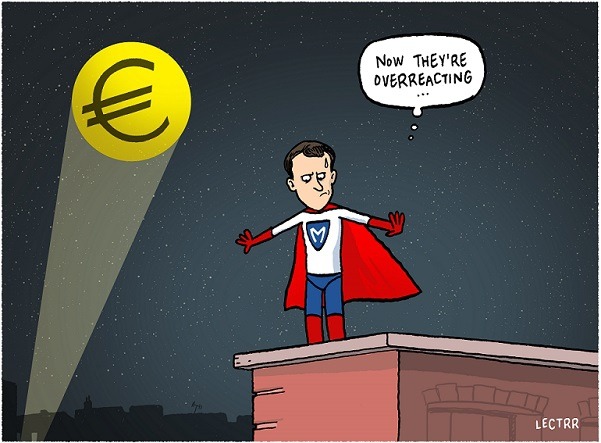Suddenly, there is hope again. Fears that Marine Le Pen of the far-right National Front might become president of France and wreck the EU were not realised this time. French voters have instead chosen a young, dynamic, enthusiastically pro-European president who wants to reform his country and revitalise the struggling EU: Emmanuel Macron. Hurrah! But it would be a big mistake for EU institutions in Brussels and Angela Merkel’s government in Berlin to view this as an endorsement of a deeply flawed status quo. In the first round of France’s presidential elections, one in two voters backed far-right or far-left candidates who hate the current EU. Even President Macron believes that “the euro is incomplete and cannot last without major reforms.”
Fortunately, Macron’s victory provides a big opportunity to fix the eurozone. But is his reform agenda sound? And will he be able to win over Chancellor Merkel (or Martin Schulz, if the Social Democrats come top in the German elections in September) and other eurozone leaders?
Make no mistake: the euro desperately needs revamping. The single currency was meant to bring the eurozone together, both economically and politically. In the years before the financial crisis, it seemed to be delivering on its economic promise: the gap in living standards between the richer north and the poorer south narrowed as German banks poured cheap money into Spain, Portugal and Greece. But unfortunately, this reckless lending financed a Spanish property bubble, Portuguese consumer boom and Greek government profligacy rather than productive investment.
When bubble turned to bust, catastrophic policy decisions by eurozone leaders – bailing out banks without fixing them, refusing to write down debts, lurching towards extreme austerity and wage cuts instead of quelling the financial panic – made matters much worse. Thus, far from bringing Europeans together, the euro has fostered economic divergence, political division and popular disenchantment over the past decade.
For sure, the eurozone is in much better shape than five years ago, when it was on the verge of collapse. Many policy mistakes have been corrected. Some institutional flaws have been fixed. Recovery has taken hold. But growth is weak and unbalanced. Unemployment in many countries remains painfully high. Living standards are scarcely higher than a decade ago. The crisis has not been resolved: it has become chronic. And that is ultimately unsustainable.
For now, the euro is primarily held together by financial intervention and fear. Financially by the European Central Bank’s buying of government bonds through its quantitative easing (QE) programme – as well as by ECB President Mario Draghi’s promise to do “whatever it takes” in extremis. And politically by the fear that leaving or breaking up the euro would be hugely costly.
But sooner or later, the ECB is going to wind down its QE programme. Moreover, Draghi’s term ends in 2019 and Chancellor Merkel wants Bundesbank President Jens Weidmann, who is much more sceptical about the ECB’s panic-quelling efforts, to replace him.
Politics may also blow a hole in the eurozone. Italy must hold elections by next May and all three main opposition parties are anti-euro. Above all, relying on fear to hold the euro together destroys support for the European project. Unless the euro is seen to make Europeans better off, it will eventually break.
The pursuit for sustainable recovery
Fixing the eurozone requires two things. Right now, a shift of policies to promote stronger, more balanced and more inclusive growth. Looking forward, a fairer, more robust and more democratic institutional framework.
Until now, the eurozone has relied mostly on cheap money from the ECB (and the resulting weaker euro) to boost the recovery. But much more needs to be done. Banks should be cleaned up and bad debts written down, not least in Italy. Greece’s unbearable debt load should be lightened. All governments, not least Germany’s, should borrow more to invest in future growth. And instead of emulating Germany’s perverse policy of holding down wages to boost exports in the name of “competitiveness” – which makes both Germans themselves and their neighbours poorer – governments should prioritise reforms to boost productivity, and thus enable workers to earn higher wages. All of that would boost domestic demand, lowering unemployment, improving public finances and making debts easier to bear.
The eurozone’s institutional framework also needs fundamental reform in four big areas: finance, fiscal policy, economic imbalances, and democratic choice and accountability.
The financial system remains alarmingly reliant on big, primarily national banks with incestuous ties to national governments. The much-vaunted banking union is a sham. Given the ECB’s closeness to the big banks that it now supervises, it is unlikely to be a more effective watchdog than national supervisors have been. And if banks get into trouble, governments can still find ways to bail them out – look at Italy – instead of forcing losses on to their private creditors.
EU fiscal rules are dangerously lopsided. When different economies share a currency – and thus have a common monetary policy and external exchange rate – they need greater fiscal flexibility to respond to national ups and downs. Yet the Stability and Growth Pact forces governments in struggling economies to tighten their belt, exacerbating downturns instead of offsetting them. Enforcing the Fiscal Compact would entail near-perpetual austerity.
Worse, there is no pressure on mercantilist economies such as Germany – which hold down wages below productivity, invest and consume too little, and therefore rely on foreign demand to grow – to boost domestic demand. Germany’s current-account surplus – the gap between domestic production and consumption – was €270 billion last year, an immense 8.6% of the economy. The upshot is that the eurozone has a deflationary bias – a big drag at a time when it is struggling with huge debts.
Last but not least, democracy is unduly constrained. Fiscal rules deny voters legitimate political choices about taxation and spending. The excessively independent ECB bosses around elected governments and takes nakedly political decisions without proper democratic accountability. Greece is a quasi-colony of its eurozone creditors.
The saviour that Europe is seeking?
What, then, does President Macron propose? He wants to loosen the red tape that holds back the French economy while keeping government borrowing within the 3% limit prescribed by EU rules. With the credibility that this combination of reform and rectitude would provide in Berlin, he plans to demand the creation of a eurozone budget that would fund common investments, provide emergency lending and smooth the economic cycle. This would be administered by a eurozone finance minister accountable to a eurozone parliament (by which he means members of the European Parliament from eurozone countries). In effect, Macron is seeking a limited form of fiscal federalism.
Now it is true that if the eurozone could make the political leap to a genuinely federal system it would work much better. Imagine a eurozone that resembled the United States, a continent-sized economy made up of many different states that enjoy considerable political autonomy. A big federal Treasury with tax-raising and borrowing powers would help stabilise the economic cycle, while European elections would determine its political priorities. The constraints on national fiscal policy would then matter much less. Failing banks would be also be tackled at a federal level, so a local bank failure wouldn’t wreck a state’s finances.
But there is no prospect of that any time soon. Most Europeans don't want it. Merkel would never agree to it. And even Macron isn't a full-fledged federalist.
What Macron may secure, if he is lucky, is a token (and thus ineffective) eurozone budget. Some argue that this would still be a step in the right direction. Yes - but not if the price was too high. If, to achieve a token budget, Macron had to use up all his precious political capital and to concede even tighter controls on national fiscal policy without any move by Germany to address its current-account surplus, the eurozone would actually be worse off.
There is arguably a better way forward. Macron should focus on domestic reforms to lower unemployment (especially among young people), free up ossified markets and lighten the tax and regulatory burden on enterprise. He should also boost public investment and offer tax breaks for private investment, and argue that this should not count towards EU fiscal rules. If the European Commission and Berlin refuse to be flexible, he should press on regardless, while reminding them that Germany fails to comply with EU rules on dangerous imbalances.
The ultimate objective should be a grand bargain to remedy many of the eurozone’s flaws. This would involve fostering a safer, more integrated and less bank-centric financial system with a truly independent bank resolution mechanism; more growth-friendly fiscal rules and an orderly mechanism for writing down sovereign debt; a more effective mechanism for tackling economic imbalances; and a more open, accountable and democratic eurozone politics. Macron might sweeten the deal with Germany by offering to shelter it under France’s nuclear umbrella.
It's a tall order. But if Macron fails and the eurozone remains dysfunctional, Le Pen – or, indeed, the hard-left Jean-Luc Mélenchon – stands a good chance of succeeding him in 2022. Is that what Brussels and Berlin want?
By Philippe Legrain


